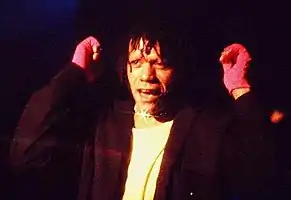Joe Leeway
Joseph Martin Leeway (born 15 November 1955, in Islington, London[1]) is the former multi-instrumentalist, and stylings guru, for the 1980s band, Thompson Twins. Leeway joined Thompson Twins in 1981 after being one of their roadies.
Joe Leeway | |
|---|---|
 Joe Leeway, Bristol, February 1984 | |
| Background information | |
| Birth name | Joseph Martin Leeway |
| Born | 15 November 1955 |
| Origin | Islington, London |
| Genres | Pop, rock, dance, new wave, synthpop |
| Occupation(s) | Instrumentalist, songwriter |
| Instruments | Keyboards Congas Backing vocals |
| Years active | 1980–present |
| Labels | Arista Records, Warner Bros. Records |
| Associated acts | Thompson Twins |
He was born to an Irish mother and Nigerian father, but was fostered to an English family in Dartford, Kent, from the age of two. At college he took English and Drama, then he began teaching English, which was how he met Tom Bailey. He joined a theatre group in Cardiff after failing to establish his own company. He spent a year with the Young Vic theatre before joining Thompson Twins as a roadie at Tom Bailey's invitation.
Thompson Twins
Playing bongos and congas, he appeared on the Thompson Twins debut record album, A Product of .... By the time the band recorded their second album Set in 1982, Leeway had begun contributing to the songwriting process, and he wrote a pair of songs for the album completely on his own and sang lead on three tracks.
At that time in 1982, Thompson Twins underwent a radical change in line-up. Previously an ever-changing lineup of musicians that featured seven members at the time of Set, band leader Tom Bailey reduced the band to a trio by firing everybody except Alannah Currie and Leeway. Leeway's main role in the new trio was to assist in writing the songs, contribute background vocals and design the band's stage shows. Leeway's background in theatre made him an obvious and well-suited choice for the latter, and the live shows of the band always met with success and critical acclaim.
Thompson Twins enjoyed at least three solid years of worldwide commercial success, beginning with the 1983 album Quick Step and Side Kick (released in the United States as simply Side Kicks) followed by Into the Gap, which garnered critical acclaim and lucrative international sales, and Here's To Future Days.
After these three albums, their contract with Arista Records was up for renewal and after the extensive world tour following the release of the album, Leeway chose to leave the band for a number of personal reasons, mostly due to difficulties with the group's management. However, the split from the rest of the trio was amicable.
Solo Work and career change
After leaving the band, Leeway dabbled in solo work. He recorded a demo tape of original material, but ultimately an album never materialised. He appeared in the 1989 James Ivory film Slaves of New York as musician Johnny Jalouse. Leeway's part in the film was originally a prominent supporting character, but this was changed when most of his scenes were cut. The actress that Leeway had filmed most of his scenes with was fired from the film and their scenes together were cut. Leeway can still be seen in the film singing one of his original songs, "Mother Dearest", in the night club scene, (not in the soundtrack album).
The experience with Slaves of New York seemed to stall Leeway's career as an actor permanently, but he continued to work in sound design for films as well as commercials for Nike and Pepsi.
As of 2006, Leeway resides in Los Angeles, California, and works in the field of hypnotherapy. He is on the staff at the Hypnosis Motivation Institute (HMI) in Tarzana, California and is also a certified trainer in neuro-linguistic programming.
References
External links
- Joe Leeway at IMDb